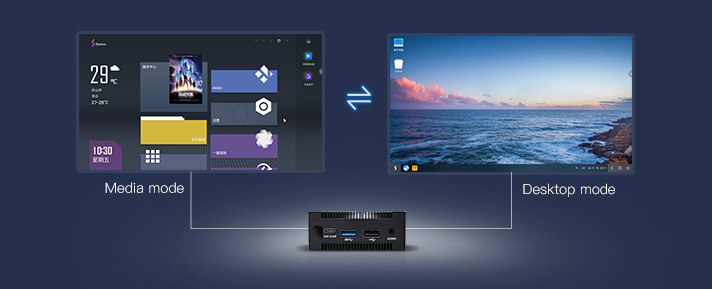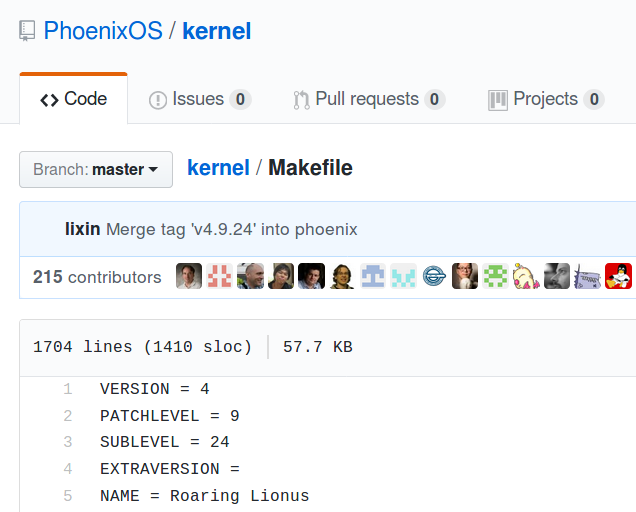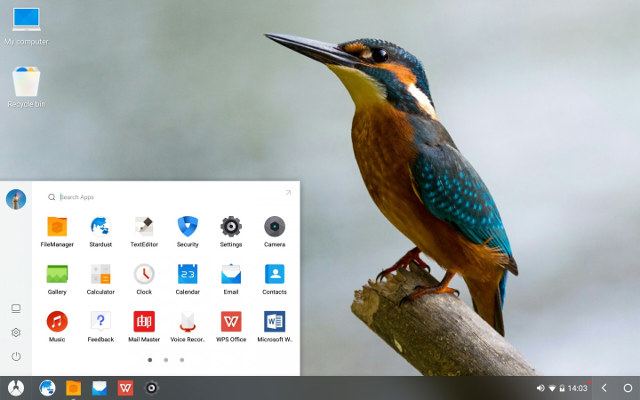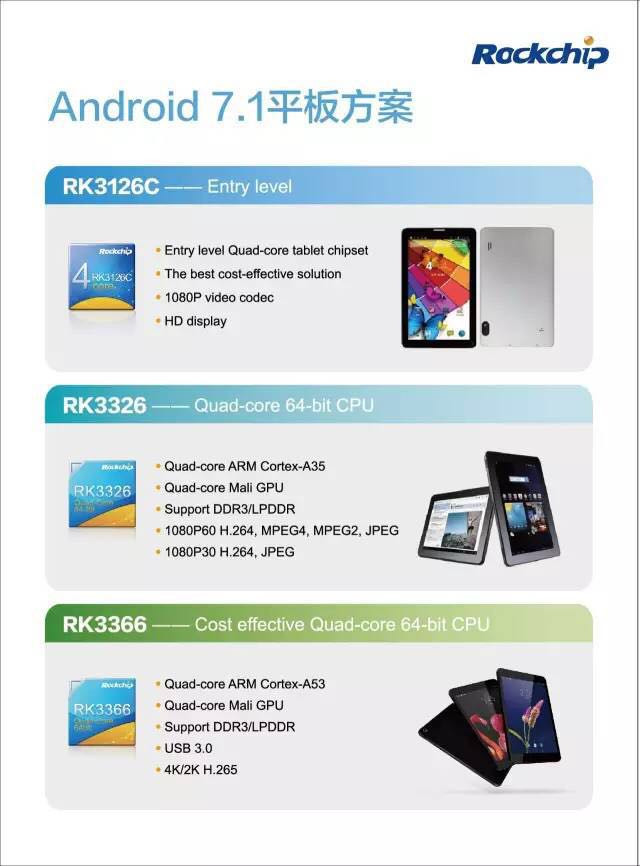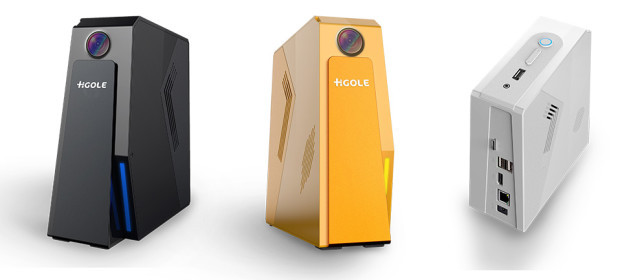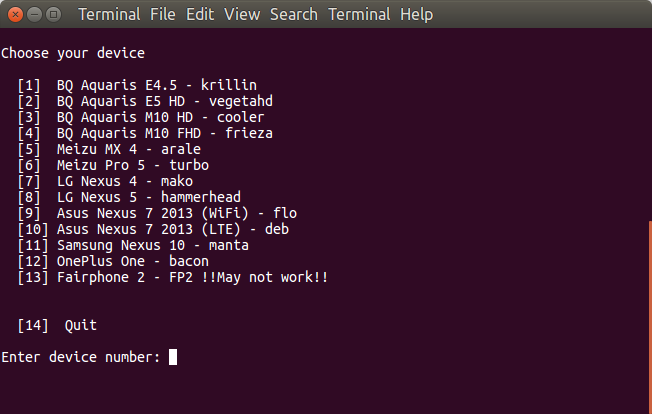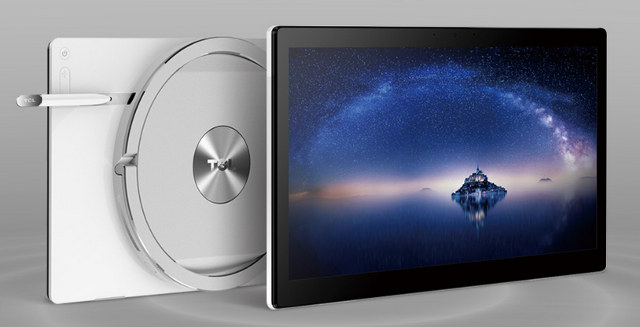T-Chip has recently introduced two fanless “Geek” mini PCs under their Firefly brand with Station P1 & M1 respectively powered by Rockchip RK3399 hexa-core processor, and RK3328 quad-core processor. Both mini PCs can run Firefly’s Station OS in either desktop or media mode, as well as Android or Ubuntu. There are also some community efforts to port Armbian and LibreELEC to the devices. Station P1 specifications Specifications: SoC – Rockchip RK3399 hexa-core processor with two Cortex A72 cores @ up to 1.8 GHz and four Cortex-A53 cores, Mali-T860 MP4 GPU with support for OpenGL ES1.1/2.0/3.0/3.1, OpenVG1.1, OpenCL, DX11, VPU with support for 4K H.265 10-bit 60fps video decoding, multi-channel 1080p video decoding and encoding System Memory – 4GB LPDDR4 dual-channel 64-bit RAM Storage – 32GB eMMC flash (16GB/64GB/128GB Optional), onboard 16MB SPI flash, MicroSD card slot Video Output HDMI 2.0a up to 4Kp60, HDCP 1.4/2.2 DisplayPort 1.2 up to 4Kp60 […]
PiPO P10 Phoenix OS 2-in-1 Laptop is Powered by Rockchip RK3399 Processor
Phoenix OS is an operating system based on Android 7.1 with desktop optimizations, and is one of the last few options if you plan to run Android on x86 platforms as other projects such as Remix OS have stopped providing images, at least for the consumer market. The operating system also work on Arm platforms, but it is not open source – except for a Linux kernel release a few months ago -, manufacturers partners with the company to port the OS to their hardware. PiPO P10 2-in-1 laptop is one of those devices, and thanks to Rockchip RK3399 processor should offer decent performance. PiPO P10 (preliminary) specifications: SoC – Rockchip RK3399 hexa core processor with 2x Cortex A72 cores, 4x Cortex A53 cores, Mali-860MP4 GPU System Memory – 4GB DDR3 RAM Storage – 32 or 64GB storage, 1x micro SD slot Display – 10.1″ capacitive touch display with 2560×1600 […]
Linux 4.9 Kernel Source Code Released for Phoenix OS Android Desktop Operating System
Phoenix OS is one of the last options left for people wanting to run Android with desktop optimizations on their computer. The problem is that so far, it was fully closed source, and the company refused to comply with the Linux kernel’s GPLv2 license, despite part of the project being based on Android-x86 work. The community also wanted to get involved to improve hardware compatibility with graphics cards, wireless modules / dongles, and other peripherals. However, without source code, nothing could be done, and a petition was launched on Change.org asking Chaozhuo, the company behind the project, to release the Linux kernel code. After over 300 signatures was reached in the petition, the company did push Linux 4.9.24 to Github, and after verifying there was indeed some changes compared to Android x86 kernel, the community declared victory. They are however trying to make the company develop the kernel in the […]
Phoenix OS 2.1 Android 7.1 based Desktop OS Released for 32-bit and 64-bit x86 Platforms
With Jide’s announcement that they’d stop working on Remix OS for the consumer market, focusing on the enterprise market instead, people who like to use Android as a desktop OS lost an option. Luckily, others have not given up on the concept yet, and Phoenix OS 2.1 based on Android 7.1 with desktop improvements has just been released for computers based on Intel/AMD 32-bit and 64-bit x86 processors. Phoemix OS user interface is a mix between Windows desktop with a desktop, a taskbar, and a start menu, and Android with notifications, and Back/Home/Recent buttons. The OS also supports Android apps, multi-window, window resizing, better multi-tasking, and so on. Changelog for Phoenix OS 2.1: Keyboard mapping updates to version 2.5 with smart casting for Strike of Kings. The bug that window size won’t be saved after restart has been fixed. Enhance the hardware compatibility, including: sound card, network adapter, etc. “Start […]
Rockchip Introduces Three Tablet SoCs: RK3126C, RK3326, RK3366, and RK3368H Processor for 2-in-1 Laptops
Rockchip has launched four more processors at the Hong Kong Electronics Fair 2017, with three SoCs specifically targeting tablets namely RK3126C, RK3326 and RK3366, and one SoC, RK3368H modified from RK3368, designed to provide a lower cost alternative to RK3288 and RK3399 for 2-in-1 hybrid laptops and tablets. The company only provided limited information with regards to the tablet SoCs specifications: RK3126C quad core processor supporting 1080p video decoding and HD (720p?) displays for entry-level tablets RK3326 quad core ARM Cortex A35 processor with a quad core Mali GPU, DDR3/LPDDR memory interface, 1080p60 H.264, MPEG-4/-2 video decoding, and 1080p30 H.264 video encoding RK3366 quad core ARM Cortex A53 processor with a quad core Mali GPU, DDR3/LPDDR memory interface, USB 3.0 interface, and 4K H.265 video decoding All three processors will be running Android 7.1. I could not find any tablets based on the processor yet, so we may have to […]
GOLE2 Mini PC Comes in Intel and ARM Flavors, Features a SATA Bay and Built-in Camera (Crowdfunding)
GOLE1 was an different and interesting product combining tablet and mini PC features into one, but I found the 5″ screen to be rather useless, and the battery did not work exactly well since it would only charge when powered off. The new GOLE2 mini PC won’t have any of those issues since it does not come with neither a display or a battery, but instead comes into two flavors with a version running Windows 10 on Intel Atom x5-Z8350 Cherry Trail processor, and another running Android based Phoenix OS on Allwinner A64 quad core ARM Cortex A53 processor. The devices also include an HD camera and microphone for video conference, as well as 2.5″ SATA bay implemented through a USB to SATA bridge. Beside the processor and memory, both GOLE2 models share the most of the same hardware specifications: SoC Intel Atom x5-Z8350 “Cherry Trail” quad core processor @ […]
Magic Device Tool Helps You Switch Between Android and Ubuntu on Supported Phones
There have only been a few phones released with or supporting Ubuntu so far, and those phones will normally be able to run Android too since Ubuntu Touch relies on Android drivers, and you may decide that Ubuntu is not for you and switch back to Android, or the contrary, if you’ve purchased an Android phone, you may want to install Ubuntu instead. In order to simplify the task of installing operating systems, Marius Quabeck has developed “Magic Device Tool“. As you can see from the screenshot above, 13 phones and tablets are currently supported. You’ll need a computer with Ubuntu 15.04 or greater to install the tool, and I’ve done so on Ubuntu 16.04:
|
1 2 3 4 |
git clone https://github.com/MariusQuabeck/magic-device-tool.git cd magic-device-tool chmod +x launcher.sh ./launcher.sh |
The script will also install phablet-tools if it is not already installed, so if you are not root, you’ll need your account to be member of sudoers. Once the initial setup is done, you’ll […]
Alcatel OneTouch / TCL Xess 17.3″ All-in-One PC Runs Phoenix OS, Supports Gesture Control
Xess (pronounced Excess) is an All-in-One PC with a 17.3″ touchscreen that runs Android based Phoenix OS on top of Mediatek MT8783 octa-core processor, with some cool added features like an adjustable stand, retractable ports, magnetic stylus, and gesture control. It is sold under the TCL brand in China, and will be launched by Alcatel OneTouch in the US and Europe. Xess specifications: SoC – Mediatek MT8783 octa-core ARM Cortex-A53 processor @ 1.5GHz with Mali-T720MP3 GPU System Memory – 2GB RAM Storage – 32GB storage + micro SD slot Display – 17.3” IPS panel with wide visual angle; 1920×1080 (16:9) resolution; 10-point touch Audio – Stereo speakers (JBL 2x 3W), 2x microphones, 3.5mm headphone jack Connectivity – WiFi and Bluetooth Camera – 5MP front camera USB – 2x USB 2.0 host port Sensors – G-sensor, 2x P-sensor, 1x L-Sensor Misc – 1x MagTouch Port, power and volume buttons Battery – […]


